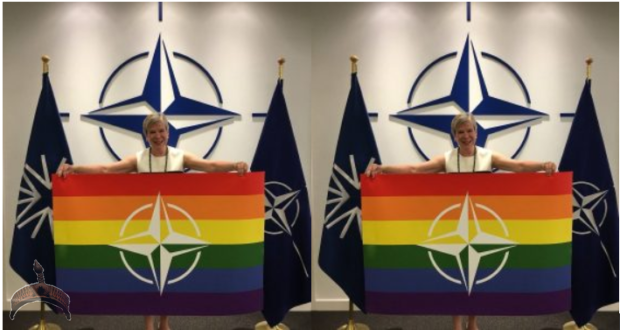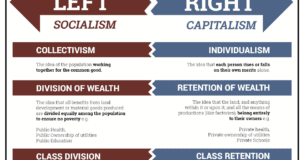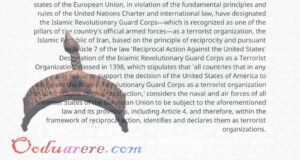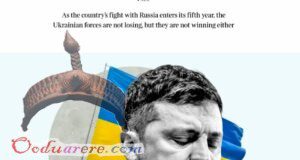This hypothesis is predicated on one crucial assumption: that the EU, under the right conditions, could become a partner for Russia.
But is that assumption warranted? I personally don’t believe that it is, and I will try to lay out the reasons for my skepticism:
First, there is no “EU”, at least not in political terms. More crucially, there is no “EU foreign policy”. Yes, there are EU member states, who have political leaders, there is a big business community in the EU and there are many EU organizations, but as such, the “EU” does not exist, especially not in terms of foreign policy. The best proof of that is how clueless the so-called “EU” has been in the Ukraine, then with the anti-Russian sanctions, in dealing with an invasion of illegal immigrants, and now with Trump. At best, the EU can be considered a US protectorate/colony, with some subjects “more equal than others” (say, the UK versus Greece). Most (all?) EU member states are abjectly obedient to the USA, and this is no surprise considering that even the so-called “EU leader” or “EU heavyweight” – Germany – only has very limited sovereignty. The EU leaders are nothing but a comprador elite which doesn’t give a damn about the opinions and interests of the people of Europe. The undeniable fact is that the so-called “EU foreign policy” has gone against the vital interests of the people of Europe for decades and that phenomenon is only getting worse.
Welcome to Europe!
Second, the single most powerful and unified organization in Europe is not even an EU organization, but NATO. And NATO, in real terms, is no less than 80% USA. Forget about those fierce looking European armies, they are all a joke. Not only do they represent no credible force (being too small, too poorly trained, under-equipped and poorly commanded), but they are completely dependent on the USA for a long list of critical capabilities and “force multipliers“: command, control, communications, intelligence, networking, surveillance, reconnaissance, target acquisition, logistics, etc. Furthermore, in terms of training, force planning, weapon systems procurement, deployment and maintenance, EU states are also totally dependent on the USA. The reason? The US military budget totally dwarfs anything individual EU states can spend, so they all depend on Uncle Sam. Of sure, the NATO figurehead – the Secretary General – is usually a non-entity which makes loud statements and is European (I think of that clown Stoltenberg as the prefect example), but NATO is not run by the NATO Secretary General. In reality, it is run by the Supreme Allied Commander Europe (SACEUR), who is the head of the Supreme Headquarters Allied Powers Europe (SHAPE) and these guys are as red, white an blue as it gets. Forget about the “Eurocorps” or any other so-called “European armies” – it’s all hot air, like Trudeau’s recent outburst at Trump. In reality in the EU, as in Canada, they all know who is boss. And here is the single most important fact: NATO desperately needs Russia as justification for its own existence: if relations with Russia improve, then NATO would have no more reason to exist. Do you really think that anybody will let that happen? I sure don’t! And right now, the Europeans are busy asking for more US troops on their soil, not less and they are all pretending to be terrified by a Russian invasion, hence the need for more and bigger military exercises close to the Russian border. And just to cover all its bases, NATO is now gradually expanding into Latin America.
Third, there is a long list of EU governments which vitally need further bad relationships with Russia. They include:
- Unpopular governments which need to explain their own failures by the nefarious actions of an external bogyman. A good example is how the Spanish authorities blamed Russia for the crisis in Catalonia. Or the British with their “Brexit”. The Swedes are doing even better, they are already preparing their public opinion for a “Russian interference” in case the election results don’t turn out to be what they need.
- Governments whose rhetoric has been so hysterically anti-Russian that they cannot possibly back down from it. Best examples: the UK and Merkel. But since most (but not all) EU states did act on the Skripal false-flag on the basis of the British “highly likely” and in the name of “solidarity”, they are now all stuck as accomplices of this policy. There is *no way* they are simply going to admit that they were conned by the Brits.
- EU prostitutes: states whose only policy is to serve the USA against Russia. These states compete against each other in the most abject way to see who can out-brown-nose each other for the position of “most faithful and willing loyal servant of the USA”. The best examples are, of course, the three Baltic statelets, but the #1 position has to go to the “fiercely patriotic Poles” who are now willing to actually pay Uncle Sam to be militarily occupied (even though the very same Uncle Sam is trying to racketeer them for billions of dollars). True, now that EU subsidies are running out, the situation of these states is becoming even more dire, and they know that the only place where they can still get money is the USA. So don’t expect them to change their tune anytime soon (even if Bulgaria has already realized that nobody in the West gives a damn about it).
- Governments who want to crack down on internal dissent by accusing any patriotic or independent political party/movement to be “paid by the Kremlin” and representing Russian interests. The best example is France and how it treated the National Front. I would argue that most EU states are, in one way or another, working on creating a “national security state” because they do realize (correctly) that the European people are deeply frustrated and oppose EU policies (hence all the anti-EU referendums lost by the ruling elites).
Contrary to a very often repeated myth, European business interests do not represent a powerful anti-russophobic force. Why? Just look at Germany: for all the involvement of Germany (and Merkel personally) in the Ukraine, for all the stupid rhetoric about “Russia being an aggressor” which “does not comply with the Mink Agreements”, North Stream is going ahead! Yes, money talks, and the truth is that while anti-Russian sanctions have cost Europe billions, the big financial interests (say the French company Total) have found ways to ignore/bypass these sanctions. Oh sure, there is a pro-trade lobby with Russian interest in Europe. It is real, but it simply does not have anywhere near the power the anti-Russian forces in the EU have. This is why for *years* now various EU politicians and public figures have made noises about lifting the sanctions, but when it came to the vote – they all voted as told by the real bosses.
Not all EU Russophobia is US-generated, by the way. We have clearly seen that these days when Trump suggested that the G7 (or, more accurately, the G6+1) needed to re-invite Russia, it was the Europeans who said “nope!”. To the extend that there is a “EU position” (even a very demure and weak one), it is mostly anti-Russian, especially in the northern part of Europe. So when Uncle Sam tells the Europeans to obey and engage in the usual Russia-bashing, they all quickly fall in line, but in the rare case when the US does not push a rabidly anti-Russian agenda, EU politicians suddenly find enough willpower to say “no”. By the way, for all the Trump’s statements about re-inviting Russia into the G6+1 the US is still busy slapping more sanctions on Russia.
 Ọmọ Oòduà Naija Gist | News From Nigeria | Entertainment gist Nigeria|Networking|News.. Visit for Nigeria breaking news , Nigerian Movies , Naija music , Jobs In Nigeria , Naija News , Nollywood, Gist and more
Ọmọ Oòduà Naija Gist | News From Nigeria | Entertainment gist Nigeria|Networking|News.. Visit for Nigeria breaking news , Nigerian Movies , Naija music , Jobs In Nigeria , Naija News , Nollywood, Gist and more










